Any video store kid of the late ’80s and early ’90s know that the erotic thriller subgenre does not refer to big budget films like FATAL ATTRACTION or BASIC INSTINCT. Big stars, slick cinematography, and a Joe Eszterhas script do not necessarily equal anything erotic or thrilling. Sure, those films have their moments of silly hysteria, but they will never measure up to the inspired soft focus erotica of a straight-to-VHS title starring Andrew Stevens, Shannon Tweed, or Adrian Zmed.
Ever ahead of the curve, in 1984 writer/director Larry Cohen inadvertently became an early practitioner of the brand of erotic thriller that would not become popular for another five or six years, with the release of SPECIAL EFFECTS and PERFECT STRANGERS.
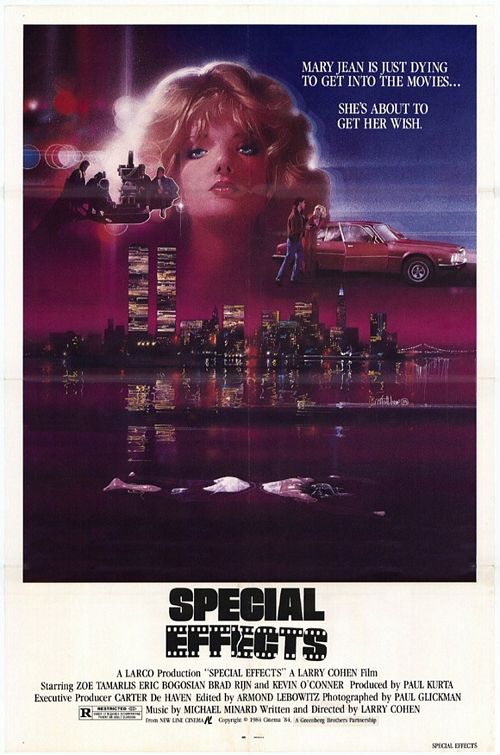
SPECIAL EFFECTS finds Cohen doing his take on the Dorothy Stratten tragedy. But where writer/director Bob Fosse’s STAR 80 combined the high gloss, pseudo-glamour of being a Playboy centerfold in the ’70s with the unrepentant ugliness of Eric Roberts’ portrayal of Stratten’s estranged husband and eventual murderer Paul Snider, Cohen’s film plunges headlong into the sleazy world of low-rent porn before going off in unexpected directions.
The Stratten analogue in SPECIAL EFFECTS is a small town Oklahoma girl named Mary Jean (a miscast Zoë Lund—credited as Zoë Tamerlis). Having left Keefe (Brad Rijn), her obsessive, mentally abusive husband and moved to New York City to become an actress, Mary Jean changes her name to Andrea Wilcox and is first glimpsed posing topless in a studio mocked up to look like the White House Oval Office. Creepy men rent cameras to take pictures of her while a bouncer keeps an eye on things.
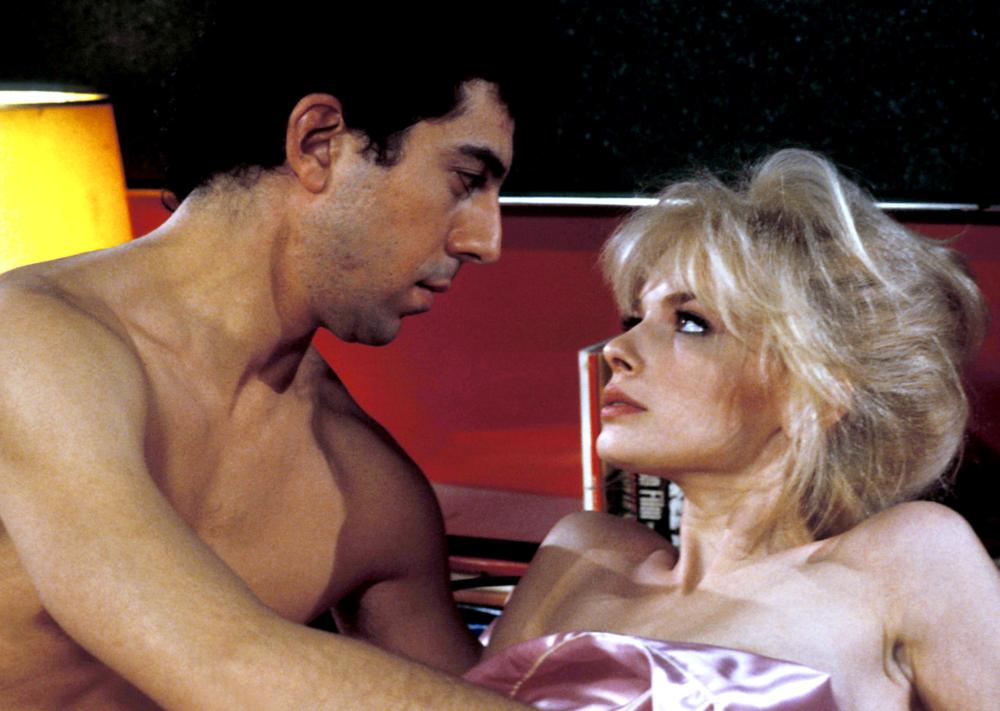
Into this striking and uncomfortable opening walks Keefe. Glowering in jealousy, he eyes Mary Jean/Andrea with anger and possessiveness. It is not hard to see the potential for violence in him even before he beats the hell out of the bouncer and chases his wife from the room. But even though Cohen quickly sets up his alternate universe Stratten and Snider, he veers away from that sordid real-life tale for something that embraces the kind of hyper-noir sensibilities that would become the bread and butter of the erotic thriller subgenre.
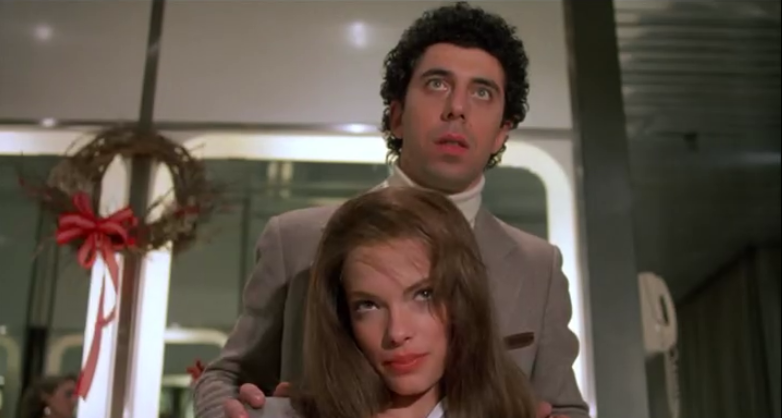
Refusing to be bullied into returning to Oklahoma with Keefe, Mary Jean/Andrea claims to be having an affair with down-on-his-luck filmmaker Chris Neville (Eric Bogosian) and then makes that fantasy happen.
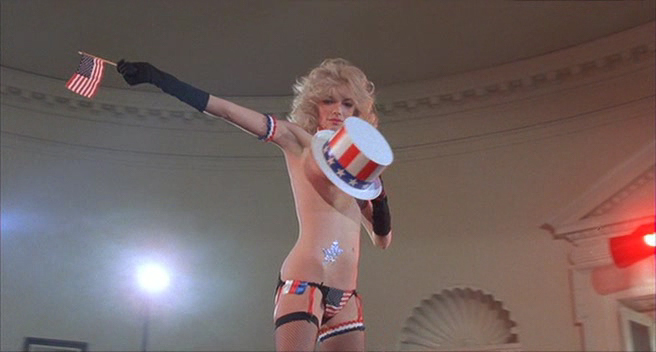
Neville used to be a wunderkind, cranking out films full of softcore sex and expensive special effects sequences. But a nervous breakdown and two financial bombs in a row have found Neville cast out of Hollywood. Frustrated, cynical, and dryly funny in that charming asshole way that Bogosian is so good at doing, Neville is quick to take Mary Jean/Andrea to bed, but things go wrong when she realizes he is filming her via hidden camera. She unleashes a string of insults about his career until he snaps and strangles her to death.
When her naked, brutalized body is found abandoned at Coney Island, it does not take long for the cops to zero in on the violent, spurned Keefe as the most likely suspect. After Keefe is arrested for the murder, Cohen takes the film into strange meta territory with Neville posting his bail and hiring him an expensive shark of a defense attorney. Neville explains that he wants Keefe’s help to make a movie about the life of Mary Jean/Andrea. He claims that he intends to create a cautionary tale about how pretty, naïve young women flock to New York and Los Angeles to become movie stars and wind up working in porn or becoming prostitutes before they fall into drugs and possible violent ends.
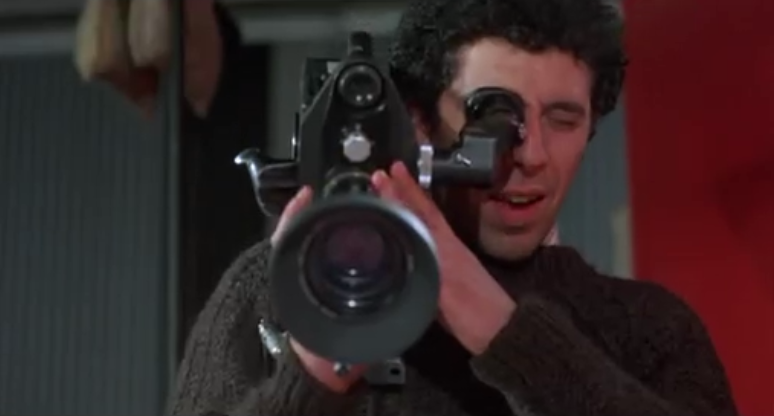
Thus begins what Cohen clearly realizes is a ridiculous thriller. The plot of Neville’s film folds in on the plot of SPECIAL EFFECTS in ways that highlight the artificiality of Cohen’s plot twists. By the time that Keefe and Neville find Elaine (also Lund), a woman who is the perfect match for Mary Jean/Andrea, things have already become so absurd in the plot that it makes sense to throw in a doppelganger.
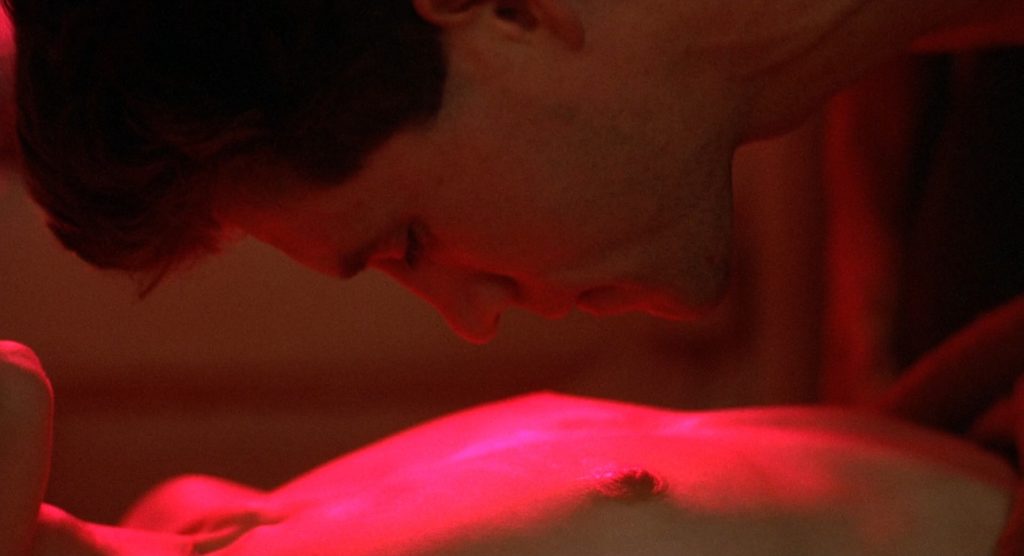
Of course, doppelgangers and characters molding them to meet their obsessive sexual needs were a staple of the direct-to-VHS erotic thriller genre. Cohen also uses several tricks that would become favorites of that genre like setting scenes in the world of pornography to justify featuring female nudity, giving “visual lip service” to female viewers by treating Rijn like eye candy as he spends at least two long scenes walking around in only tight briefs, and never missing an opportunity to get Lund out of her clothes. There is even a spin on the “bobbing, hairy man ass” overhead shot that is repeated so often through the filmography of Jag Mundhra.
In all honesty, there are two things that keeps SPECIAL EFFECTS from fitting completely into the types of films that would come along half a decade later. The first is its higher production values. Cohen shot almost the entire film on location, taking advantage of crowded streets, sprawling warehouse conversions, restaurants, airports, and dingy New York apartments. The second difference is how good Bogosian is as the charismatically sleazy Neville. As much of a jerk as Neville is when making his film, he should not be attractive to Elaine, but Bogosian makes him a magnetic figure. The needed romantic triangle between Elaine, Keefe, and Neville would not have worked without him and he brings so much personality and authenticity to his role that it’s almost a shame that the plot requires the audience to hate his guts.
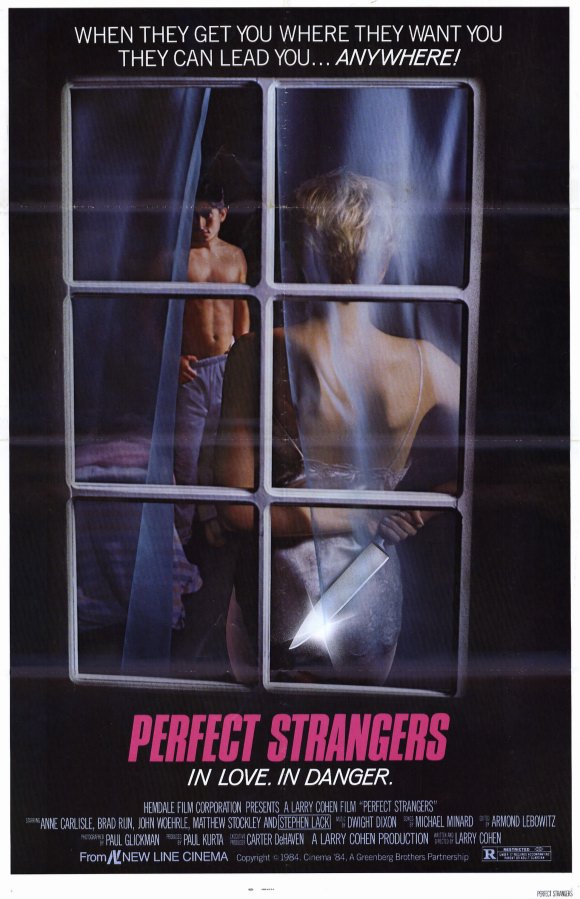
Apparently shot back to back with SPECIAL EFFECTS, PERFECT STRANGERS shares the same crew, and a lead in Brad Rijn. Of the two films, it is clearly the inferior one, but it does share the threadbare look, feel, and plotting of so many circa-1992 erotic thrillers—even if it does not have nearly as much sex as those films.
There is something vaguely homoerotic about the opening of the film. Handsome Johnny (Rijn) makes eye contact with a man in a business suit on the street. Johnny makes a slight motion with his head to follow and leads the man down an alley. They glance around at the back windows of the apartment buildings, as the man in the suit gets more anxious. But what initially seems like prostitute-client encounter turns out to be a set up for a gangland hit. The man in the business suit gets frustrated, asks Johnny if he has something for him, and gets stabbed in the stomach and has his throat slashed in response.
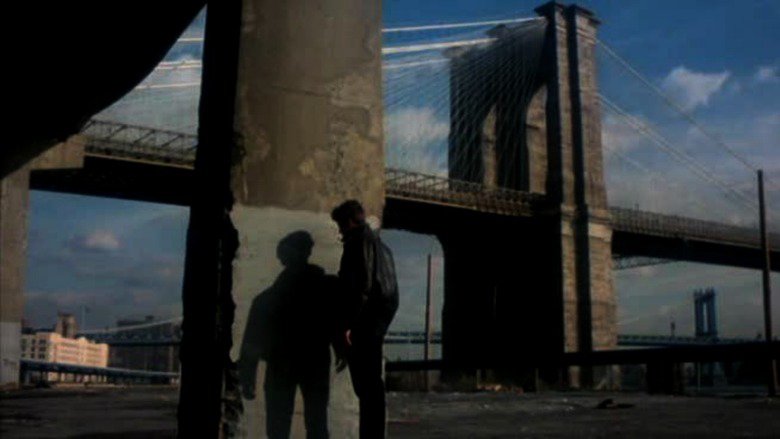
On the other side of a gate leading from a back yard to the alley is a witness to the crime: two-year-old Matthew (Matthew Stockley). Johnny sees Matthew before fleeing the scene of the crime. He then makes the idiotic mistake of telling his Mafia handler about Matthew. Johnny assumes that everything is fine because a toddler would never be able to identify him. But as word makes its way up the chain of command, Johnny’s mob boss is not so sure. To avoid the heat that would come down from murdering a child, the boss comes up with the plan that Johnny should romance Matthew’s mother, get her comfortable with him looking after the child, and then kill him in a way that just looks like a tragic accident. Seriously.
Johnny reluctantly goes along. His reluctance turns into a full-blown crisis of conscience when he meets Sally (Anne Carlisle), Matthew’s mother. Sally is a flighty sort who lives a pseudo-bohemian lifestyle. She left her husband when he gave her money and told her to get an abortion after revealing her pregnancy. She restores old clothing and sells her merchandise to vintage shops. She is fairly easy-going but hangs out with a group of militant women who hate men to the point of wanting to murder them (the film’s idea of feminism is hilariously wrong). And she falls for Johnny’s meat-headed charm and good looks almost immediately. For his part, Johnny returns her affection, but seems to enjoy the idea of playing father to Matthew more than anything else. All of which leads to the central dilemma of the movie when Johnny’s Mafia bosses make him choose between killing Matthew and getting whacked himself.
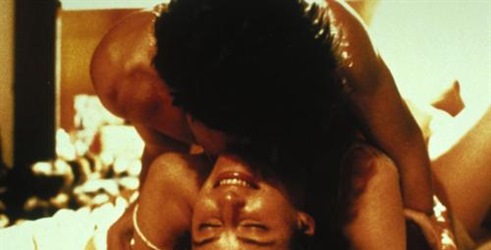
In any realistic setting, the central idea of the film would be a bunch of crap. The reason that Johnny is valued as an assassin by the mob is because he is good with a knife and has never been arrested—hence, no fingerprints on file. Even if he were able to play off Matthew’s murder as an accident, he almost certainly would have to at least go to the Grand Jury, which means being processed. In other words, he would be fingerprinted and no longer of any use.
But since this is a movie and not real life, Johnny’s predicament makes for diverting, sudsy entertainment even before taking into account that the whole film looks like it was shot through a few layers of gauze.
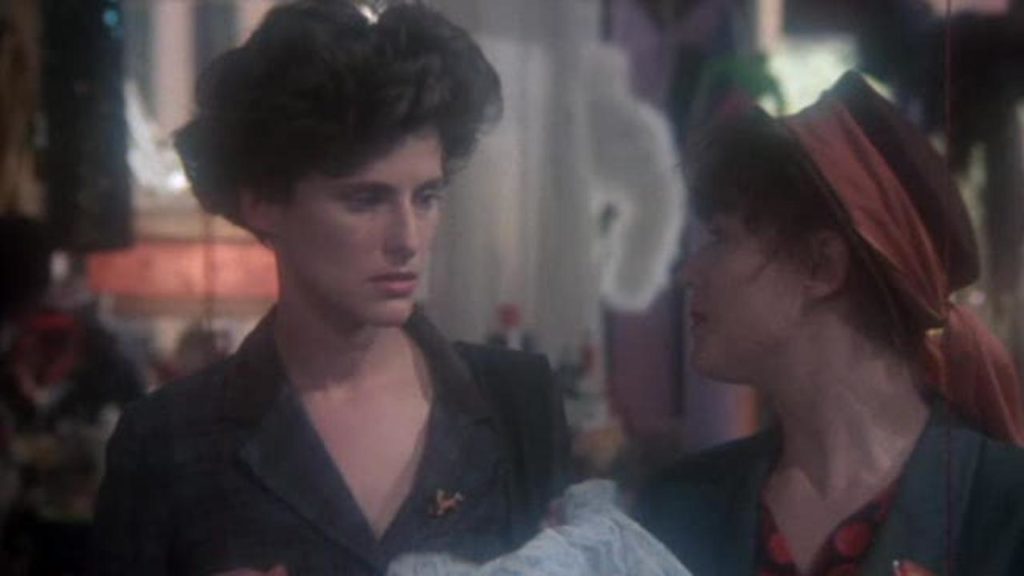
Regular Cohen cinematographer Paul Glickman does not just shoot the film in soft focus. Characters are put in front of white walls with bright light bouncing off them, making everyone look they are stepping out of some rift in time and space. The effect is disorienting and places the feel of the film firmly in a sensual realm even before an ultra-stylized sex scene that looks like it belongs in something directed by Gregory Dark in his softcore-directing career.
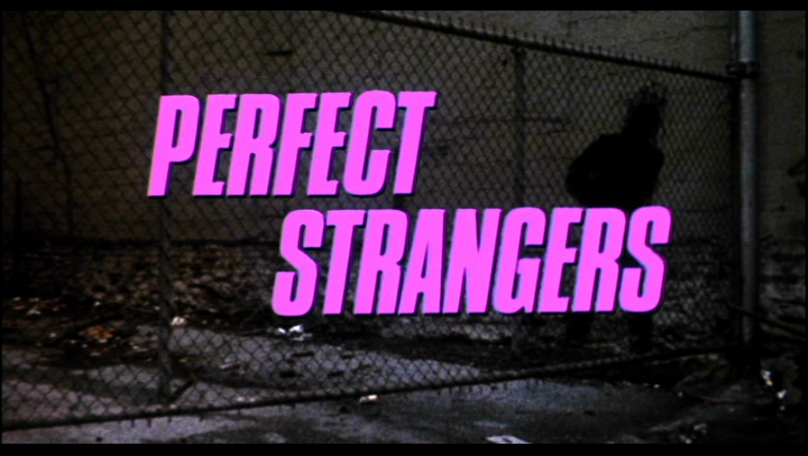
Where PERFECT STRANGERS fails to live up to the films it helped inspire is in the casting of Carlisle. Rijn brings the smoldering, potentially violent bad boy persona that is essential to the film, but Carlisle comes off as aloof and cool. She never once comes close to providing the erotic charge needed and leaves the passion of the central relationship resting completely on Rijn. Thankfully Rijn gives it his all and turns in an alternately brooding, sexy, and livewire performance that taps into the hidden insanity of his character.
Neither film is a forgotten classic. SPECIAL EFFECTS is worth seeking out for Bogosian’s performance and Cohen’s trippy plotting. PERFECT STRANGERS is rougher around the edges and flat out awful in the scenes dealing with Sally’s feminist organization, her ex-husband, and the ineffectual cop on the murder case. But between the two films, Cohen accidentally helped create the template for the erotic thrillers that would eventually line the walls of Blockbuster video stores across the country. There are worse legacies for a film to have.
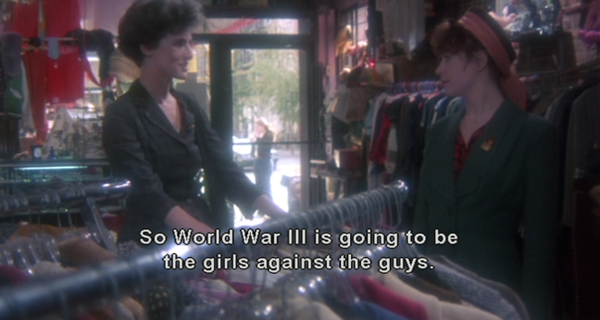
Tags: Ann Magnuson, Anne Carlisle, Crime, Dorothy Stratten, Eric Bogosian, Larry Cohen, Paul Glickman, Softcore Week, Stephen Lack, The 1980s, Zoë Lund, Zoë Tamerlis

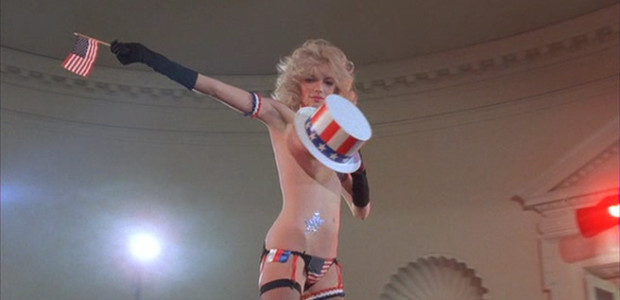
No Comments